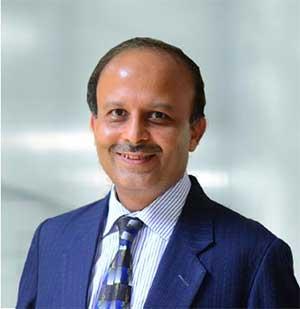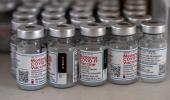'The tie-up with Serum Institute Life Sciences brings to the table their strengths in manufacturing and also their vaccine portfolio.'

The market share that Biocon Biologics' insulin Glargine injection has gained in the US has been partially offset by price erosion in the company's key products.
"One has to sacrifice short-term Ebitda for long-term growth," Arun Chandravarkar, MD, Biocon Biologics tells Sohini Das/Business Standard.
You have gained market share in the US for your insulin Glargine injections. What is the outlook for FY23?
Prior to the interchangeable status (with Sanofi's Lantus) we already had Glargine approved in the market, but the pharmacies could not switch prescriptions.
At that point, the market share was hovering in the low single digits.
After the interchangeability status that we got last year, we were able to actually bid for formulary positions.
These cycles typically go by calendar year, and formulary positions have opened up for us since this January.
From the sub-three per cent levels in January, it has crossed nine per cent now, and is inching up. I think this growth will continue now.
From eight per cent last quarter, it has touched 10 per cent market share levels now.
By the end of this calendar year, we should be in the mid-teens in terms of market share.
The prices of some of your key products, such as trastuzumab and pegfilgrastim, have eroded by 25-35 per cent. What are the challenges ahead?
While we have filed for new products, the inspections by the USFDA could not happen due to travel restrictions.
We expect an inspection next month or so, which will clear the way for some products like generic Bevacizumab.
Also, unlike the diabetes or insulin market, the oncology market in the US works slightly differently-through the hospital channel.
The market share gains are thus not as rapid as in insulin; it's a slow but steady process. But once you gain market share, it is resilient.
Also, the player that has an entire portfolio of cancer products has an edge in this hospital channel sales. Therefore, building a portfolio here is important.
Biologic drugs worth about $70 billion are likely to go off patent in the next five years or so. How are you planning to make the most of this opportunity?
Our gross R&D costs now would typically be 12-14 per cent of revenues.
Investments in R&D are judicious and essential to secure our future. But the disadvantage is the short-term optics as it impacts our Ebitda.
In the long term, we will have a sustainable portfolio.
Most of our pipeline is public, and we are building around 20 biosimilar molecules for the future.
We have planned our pipeline in a way that every one or two years there will be one launch or the other coming up during this decade.
Depending on the therapy area, it can cost anywhere between $50 million-$100 million to develop these molecules. That is the kind of R&D budget we are looking at.
How are you planning to keep costs under control with a large R&D outlay?
In this business, with price erosion, cost competitiveness is a key to success.
We are focused on cost optimisation -- we are constantly trying to improve our throughput, reduce overheads, costs, build economies of scale by building large factories, etc.
Just like I mentioned from an R&D perspective, one has to sacrifice short-term Ebitda for long-term growth.
Digitisation and automation too are active tools for cost control.
 IMAGE: Arun Chandravarkar. Photograph: Kind courtesy Biocon.com
IMAGE: Arun Chandravarkar. Photograph: Kind courtesy Biocon.comTell us about the growth in your India business.
India is a retail business, and for us it is growing well. We have 5-6 core brands and are focusing on them.
Internally, we have set ambitious targets, but would not wish to give any guidance. As such, we have grown market share and there is also prescription growth.
After the insulin Glargine interchangeability with Lantus in the US, there is a higher acceptability of our insulin products among doctors here.
By when do you expect to generate revenue from the Serum Institute tie-up?
The tie-up with Serum Institute Life Sciences brings to the table their strengths in manufacturing and also their vaccine portfolio.
We have access to their portfolio and can sell the vaccines in the markets in which they have been approved.
We have access to the territorial rights that Serum Institute has.
We now have access to 100 million annual doses of vaccines from them, and in return for the shareholding they got in Biocon Biologics, they have committed revenues and margins to us for the first five years.
We can also think of expanding this collaboration beyond the current portfolio of vaccines.
Revenues from this tie-up will start kicking in this October.
Feature Presentation: Ashish Narsale/Rediff.com










